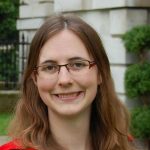Friday, January 20, 2017
2:00pm-3:00pm
 Speaker: Asheleigh Theberge
Speaker: Asheleigh Theberge
Affiliation: University of Washington
Location: MC 102
Date and time: January 20, 2017, 2-3 PM
Abstract
Small molecule and protein signals provide a rich vocabulary for cellular communication. To better understand these signaling processes in both normal and disease states, there is a growing need for cell culture platforms that interface with analytical chemistry tools and recreate key features of the in vivo cell microenvironment. We have developed new microfluidic methods for cell culture that (1) integrate organic solvents for small molecule extraction facilitating downstream metabolomic analysis using mass spectrometry and (2) accommodate the culture of multiple cell types in microfabricated compartments connected via channels to facilitate soluble factor signaling. Our microscale culture systems allow a 10- to 500-fold reduction in volume compared to conventional assays, enabling experiments with limited cells from patient samples. Furthermore, our devices are open, pipette accessible, and mass-producible by rapid injection molding, increasing translation to collaborators in biological and clinical labs without engineering expertise. This talk will highlight our recent work studying the interplay between cell types in prostate disease and asthma.
Speaker biosketch
Ashleigh Theberge is an Assistant Professor of Chemistry at the University of Washington and Adjunct Assistant Professor of Urology at the University of Washington School of Medicine. She received her BA in Chemistry at Williams College and her PhD in Chemistry at the University of Cambridge, UK with Wilhelm Huck. During her graduate work, she was a Visiting Scientist with Andrew Griffiths at the Université de Strasbourg, France. Her graduate research focused on droplet-based microfluidics for chemical synthesis and analysis. She completed her postdoctoral fellowship in Biomedical Engineering and Urology with David Beebe, William Ricke, and Wade Bushman at the University of Wisconsin-Madison. In 2014, she was awarded an NIH K Career Development Award from the NIDDK in Urology. She joined the faculty at the University of Washington in 2016. Her group develops new microscale culture and analysis methods to study cell-cell, cell-extracellular matrix, and host-microbe interactions, with a focus on inflammation in urologic diseases and asthma.